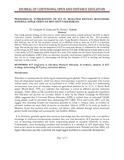| dc.contributor.author | Gakuu, Christoper Mwangi | |
| dc.contributor.author | Kidombo, H.J | |
| dc.date.accessioned | 2013-06-21T06:18:50Z | |
| dc.date.available | 2013-06-21T06:18:50Z | |
| dc.date.issued | 2010 | |
| dc.identifier.uri | http://scholar.google.com/scholar?hl=en&q=kidombo+hariet&btnG=&as_sdt=1%2C5&as_sdtp= | |
| dc.identifier.uri | http://erepository.uonbi.ac.ke:8080/xmlui/handle/123456789/37115 | |
| dc.description.abstract | This article presents findings on the extent to which selected secondary schools in Kenya use ICTs to deliver curriculum content. Qualitative and quantitative methods were used to collect the data. Five secondary schools in urban and rural areas were targeted for study. Using Bennett’s Hierarchy of Evidence Model, the data indicates that all the five secondary schools are at different levels in their use of ICT in curriculum delivery. While some are at the level of acquiring the physical and human resources, others are at the learning stage. The results also show that the integration of ICT in curriculum delivery is influenced by the ownership of the school, its ICT policy and the school manager’s level of ICT skills. While private schools seem to have a clear policy on ICT integration, public schools have none. This implies that the Kenya Government should develop and implement an ICT policy on education. Secondly, head teachers should have ICT skills because they can act as change agents by encouraging and driving the adoption of ICT in teaching and learning processes in their schools. | en |
| dc.language.iso | en | en |
| dc.title | Pedagogical Integration of ICT in Kenyan Secondary Schools: Application of Bennett | en |
| dc.type | Article | en |
| local.publisher | Education, University of Nairobi | en |

